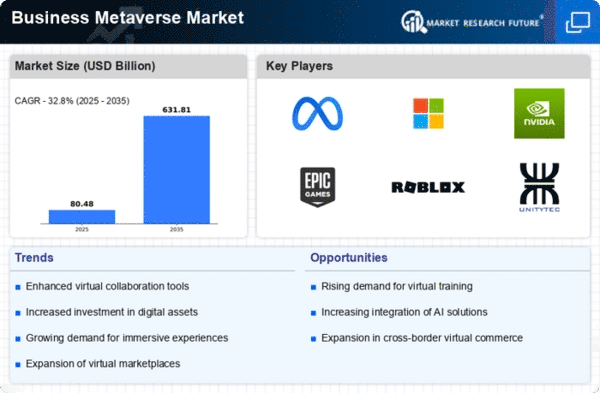Top Industry Leaders in the Business Metaverse Market

Business Metaverse Market: Dive into the Latest News and Updates
The metaverse, a persistent, immersive virtual world merging physical and digital realms, is captivating imaginations and businesses alike. Understanding the key players, their strategies, and the dynamics shaping market share is crucial for navigating this exciting and fast-evolving landscape.
Some of Business Metaverse Companies Listed Below:
- Microsoft
- Sony
- Meta
- Adobe
- HPE
- Deloitte
- Tech Mahindra
- Ansys
- Autodesk
- Intel
- HTC
- Apple
- Qualcomm
- Tencent
- Among Others
Strategies Driving Market Growth:
- Focus on Collaboration and Productivity: Metaverse platforms offer virtual meeting rooms, shared workspaces, and immersive presentations, fostering enhanced collaboration, communication, and remote team engagement.
- Improved Training and Learning Experiences: Gamified learning modules, interactive simulations, and immersive training environments create engaging and effective learning experiences for employees.
- Virtual Product Design and Prototyping: Businesses can design, test, and iterate on products in real-time within a virtual environment, reducing development costs and accelerating time to market.
- Enhanced Customer Engagement and Marketing: Creating immersive brand experiences, virtual showrooms, and interactive product demonstrations engages customers and drives brand awareness and loyalty.
Factors Influencing Market Share Analysis:
- Target Industry and Application Focus: Understanding the specific needs and challenges of different industries, such as manufacturing, retail, or healthcare, is crucial for tailoring solutions and achieving market success.
- Technology Innovation and Interoperability: Offering advanced features, seamless integration with existing platforms, and open-source standards attract wider adoption and foster ecosystem development.
- Security and Data Privacy: Implementing robust security measures and transparent data privacy practices build trust and encourage wider business adoption.
- Accessibility and Affordability: Offering diverse hardware options, flexible pricing models, and cloud-based solutions make the metaverse accessible to businesses of all sizes.
New and Emerging Companies:
- Focus on Niche Verticals and Specialized Solutions: Startups like Neuroverse offer metaverse solutions for the healthcare industry, while Virtuoso focuses on creating immersive marketing experiences, addressing specific industry needs and expanding application scope.
- Focus on Interoperability and Open-Source Platforms: Players like Spatial strive for open-source platforms and interoperable standards, facilitating broader ecosystem development and user choice.
- Focus on Accessibility and User Experience: Companies like EngageVR offer browser-based metaverse solutions, reducing hardware barriers and creating user-friendly interfaces for wider adoption.
Current Investment Trends:
- Venture Capital Funding: Innovative startups developing cutting-edge metaverse technologies and niche solutions attract significant venture capital funding, fueling market diversification and innovation.
- Strategic Partnerships and Acquisitions: Established players are partnering with startups or acquiring niche expertise to expand their offerings and address emerging market needs.
- Investments in Infrastructure and Hardware Development: Growing investments in cloud infrastructure, VR/AR headsets, and haptic technologies accelerate the development of the metaverse and create new business opportunities.
Latest Company Updates:
- Jan 28, 2024: The Open Metaverse Coalition, a group of tech companies and organizations, is formed to promote interoperability and open standards in the metaverse, potentially benefiting businesses by ensuring cross-platform compatibility.
- Jan 21, 2024: Cybersecurity experts highlight the need for robust security measures in the metaverse, as virtual environments face unique security challenges.










